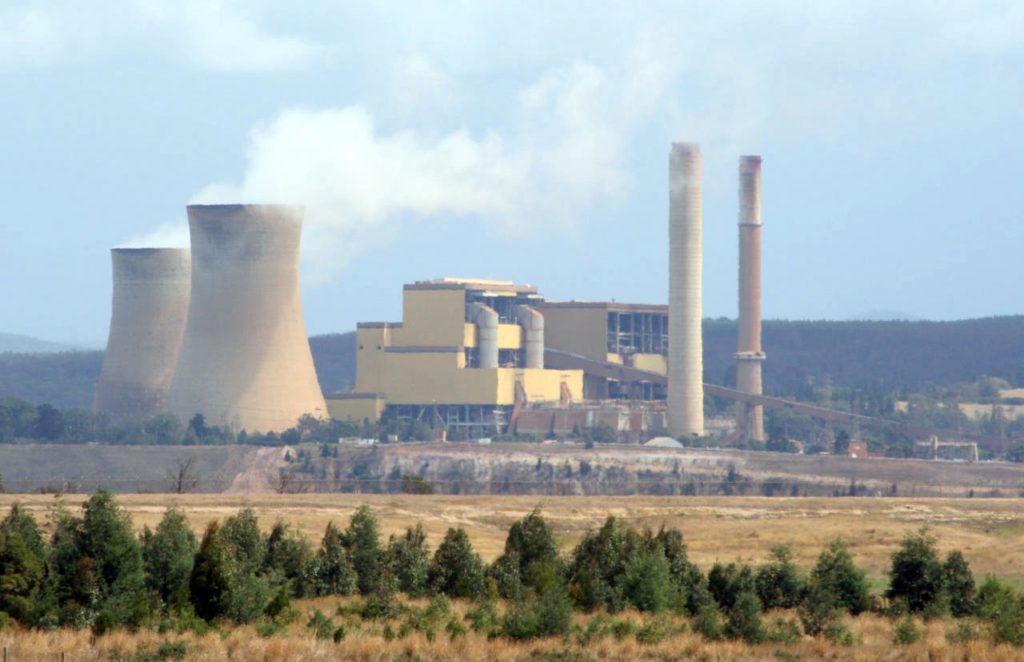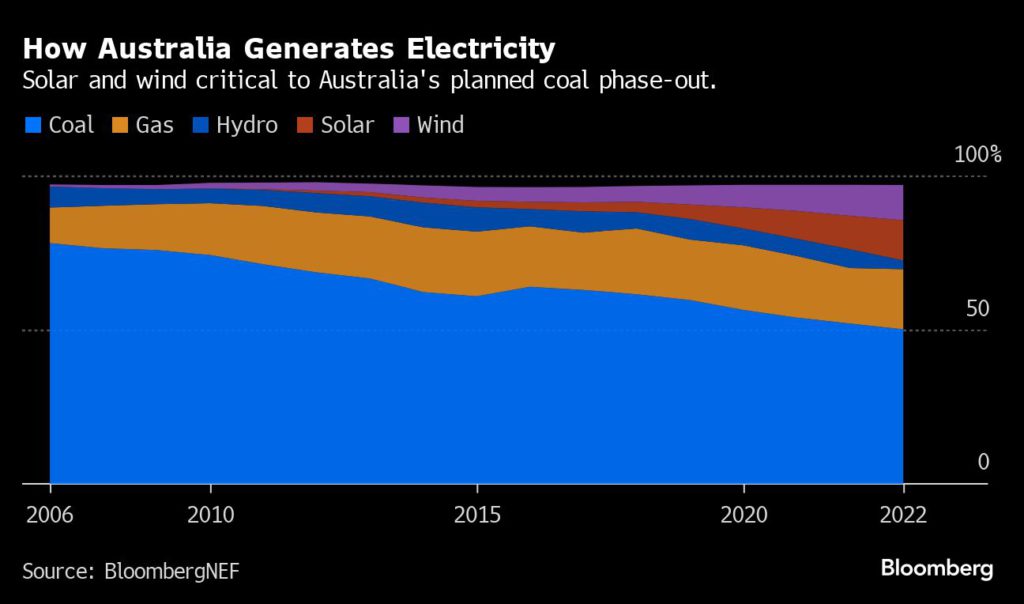News
There’s a way to quit coal without wrecking jobs and communities 1
Bloomberg News | December 7, 2023 | 1:25 pm

Yallourn Power Station. Credit: Wikipedia
It’s a persistent global conundrum: Can policymakers close coal mines and power plants without ruining local economies in the process?
In August, a delegation of Vietnamese officials looking to answer that question took the two-hour drive east from Melbourne into the Latrobe Valley. Bundled against the Australian winter, they sped past the cooling towers of the Yallourn power station and the open-cut mines near Morwell, vestiges of the region’s rapidly dying industry. The 18 members of parliament visited a new battery facility built on the site of a now-defunct coal-fired power station, and met with local leaders to discuss their approach.
After almost a century as Victoria’s central provider of electricity — some 90% comes from Latrobe and the broader Gippsland area — most of its mines and power stations are scheduled to close between 2028 and 2035, if they haven’t already. Yet the area has kept decline and diseases of despair at bay, with plans for solar farms, battery storage and the country’s first offshore wind installations. Unemployment is low and the population — currently about 300,000 — is growing, along with household income. Real estate values are rising.
“There is a confidence, in the community, that we’re going to be okay,” said Chris Buckingham, head of the Latrobe Valley Authority, a regional agency created in 2016 to help manage the coming energy transition. “This is not a smiling-while-drowning conversation, right? This is about, if we get this right, if we work together in a harmonious way, we’re far more likely to come out ahead.”
Coal, the dirtiest fossil fuel, still generates about a third of the world’s electricity. It’s especially common in emerging economies, which need fast, cheap, reliable energy and often argue that they shouldn’t have to jeopardize their development to solve a problem that, historically, they didn’t create. Renewable energy has made huge strides, but problems run deeper in countries with constrained infrastructure, and there’s no easy solution: Already-rich countries have yet to deliver the billions promised to fund a transition, and the economic blight triggered by the closure of mines and power plants in the US, UK and Europe is hardly inspirational.
Still, pressures to quit coal are accelerating. All parties to the Paris Agreement have to submit an emission-cutting plan to the United Nations, and foreign funding for coal has largely dried up. The 2021 COP climate talks in Glasgow introduced aid packages to help developing nations speed the closure of coal plants.
Last year, Vietnam signed one of the world’s largest climate finance deals worth $15.5 billion, designed to encourage an orderly coal phase-out that also protects its economy. By its own timeline, it has about 25 years to burn the fuel — and to plan for its peaceful demise.
The idea of slowly, deliberately phasing out coal is relatively new. It hinges on cooperation from the fossil fuel industry and compromise from climate activists. The opportunity to learn from earlier, chaotic mine closures elsewhere is, ironically, a byproduct of Australia’s historically late arrival to climate action. The country is still highly reliant on coal — more so than Vietnam, by some measures — but the Latrobe Valley transition is critical to its new net-zero ambitions.
Emerging economies have less money to spend and a wide range of competing priorities — including growth, which depends on more power, not less. But the broad challenges are similar enough, said Thang Do, a climate policy researcher at Australian National University who organized the study tour for the Vietnamese lawmakers.
“People are worried: ‘If we shut down coal, what will the alternatives be? And how about the workers in the mines and the plants, and their families?’” he said. “You cannot just close the coal power next year or even in the next five years. But planning — that is something policymakers could do.”
The pain of past economic upheavals remains sharp in the Latrobe Valley. People are still talking about the thousands of jobs destroyed with the privatization of the state electricity commission in the 1990s. Then there was the abrupt closure of the Hazelwood mine and power station in 2017, three years after the devastating fire that spewed smoke for six weeks and caused damage upwards of A$100 million ($66 million at today’s exchange rates).
Even before that, Tony Wolfe had started advocating for a shift to renewables. He was 15 years old when he started as an apprentice electrician at Hazelwood; he wrapped his career 44 years later at AGL Energy Ltd.’s Loy Yang B. By the midpoint, though, he said, “I could see the writing on the wall. I was working at a power station for 29 years that was designed with a 35-year life span. We hadn’t even talked about planning for another one.”
Wendy Farmer, whose husband worked at Hazelwood and volunteered for the local fire brigade, came to a similar realization. In the wake of the fire, she grew furious at the failure of government and industry — and her neighbors — to acknowledge the harms caused by coal.
“If your baby can’t breathe at night because of the pollution in the air, you get it. It becomes personal,” said Farmer. She started a group called Voices of the Valley. Initially focused on demanding accountability for the fire, they were soon calling for a total overhaul of the area’s economy.
“We would say, ‘We need to transition, we need to improve our health,’” she recalled. “And they would say, ‘We’ve got coal ’til 2048, we don’t need to transition.’”
Voices of the Valley developed its own proposal for the region, then began to lobby the Victoria government. When the state established the LVA and announced A$266 million in funding for the region, Energy Minister Lily D’Ambrosio tweeted, “We heard you @wendyfarmer_.”

RELATED NEWS
- O+ Tower Project Showcases Our Production Prowess 2025-02-20
- Guangdong Aluminum Association and Moscow University Business School visited Gua 2024-12-12
- Guangdong Aluminium Association International Trade Co., Ltd. signed an overseas 2024-11-21
- Guangdong Aluminum Association International Trade Co., Ltd. Participates in the 2024-11-15
- Simplified Approach to Spandrel Area Treatment in Curtain Wall Glazing 2024-10-25
CATEGORIES
LATEST NEWS
CONTACT US
Contact: Manager:Miss Jasmien
Phone: +8618825429836
E-mail: info@gdaa-cn.com
Whatsapp:+8618825429836
Add: Headquarter:No.8,Yixian Road,GDAA Mansion,Guangfo Zhicheng, Dali Town,Foshan,Guangdong.China
